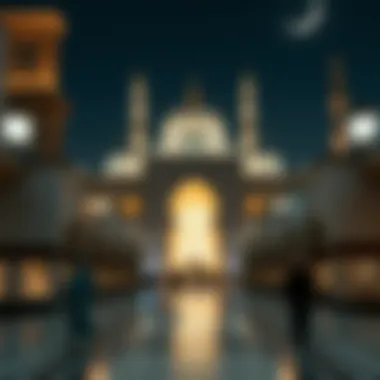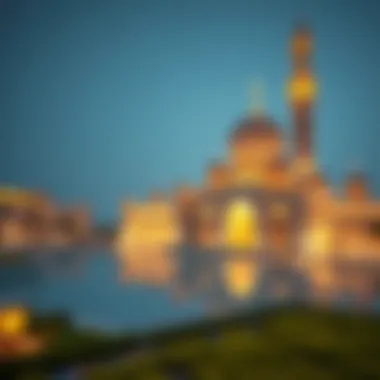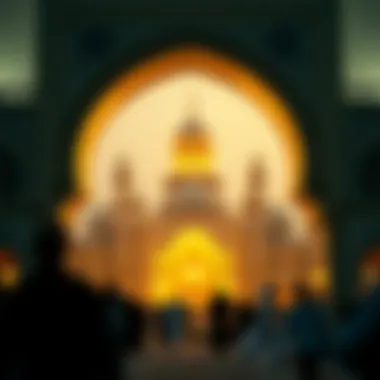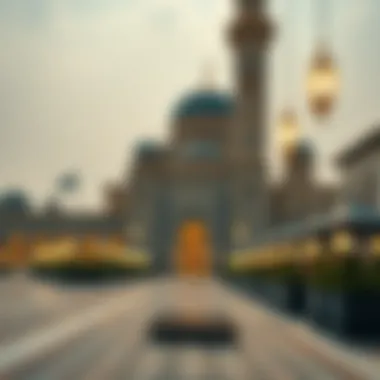The Timing of Ramadan in Dubai: Overview for 2023


Intro
Ramadan holds a significant place in the cultural and spiritual fabric of Dubai. As the holy month of fasting observed by millions of Muslims worldwide, it transcends mere religious practice. In many ways, it shapes the day-to-day life of residents, influences business activities, and impacts market dynamics, especially in the real estate sector.
For those observing Ramadan, the holy month is a time for reflection, community, and spiritual growth. In Dubai, the observance has developed unique characteristics, marrying age-old traditions with the vibrancy of modern life. This article delves into the nuances of Ramadan in 2023, shedding light on its timing, the cultural practices associated with it, and how the month affects economic activities, particularly real estate investments in this bustling metropolis.
Understanding the timing of Ramadan each year involves more than just checking a calendar; it requires knowledge of the lunar calendar and the way the Islamic calendar operates. In this article, we will explore how knowing the dates of Ramadan and its implications can significantly influence both residents and potential investors in Dubai's real estate market.
As we navigate through this landscape, we will discuss several critical elements. From insights into the local market trends during Ramadan to practical investment tips tailored for both seasoned investors and first-time buyers. The intersection of faith and commerce here offers a unique lens through which one can appreciate and engage with Dubai.
With this backdrop set, let’s dive into the market insights that define this dynamic city during Ramadan.
Intro to Ramadan
Ramadan holds a prominent position within the Islamic calendar, representing a month of fasting, reflection, and spiritual growth. This section serves as a gateway to understanding Ramadan's multi-faceted significance, especially in a vibrant city like Dubai. As the holy month approaches, many anticipate not just its religious aspects, but also how it intertwines with cultural practices, community life, and even economic activities in the emirate.
Understanding Ramadan's Importance
In essence, Ramadan is the ninth month of the Islamic lunar calendar, marked by fasting during daylight hours. The fast, called sawm, is obligatory for adult Muslims and serves as a means of self-discipline and spiritual purification. This month is not just about refraining from food and drink; it embodies a larger commitment to prayer, reflection, and community.
The importance of Ramadan extends beyond individual practices. It’s a time when individuals come together, fostering a sense of solidarity and compassion among family, neighbors, and communities. For many in Dubai, this period is imbued with deep spiritual meaning and connects followers to their faith, their families, and their cultural heritage.
One might find themselves asking, why is it so crucial? In a world often distracted by material pursuits, Ramadan serves as a reminder to prioritize spiritual growth and empathy. It urges people to reflect on their lives and to cultivate gratitude, not just for themselves, but for those who are less fortunate.
Cultural Significance in Dubai
In Dubai, where a multitude of cultures converge, the significance of Ramadan extends even further. The diverse population means that the celebrations and observances of Ramadan are enriched by a variety of customs and traditions, resulting in a unique tapestry of cultural expressions.
During Ramadan, you'll see the streets alive with activity, especially as the sun sets. The communal spirit can be felt through events like Iftar, the breaking of the fast, which allows Muslims to gather and share meals with family and friends. This gathering goes beyond religious obligation; it brings together communities and fosters relationships.
Additionally, businesses adapt to the rhythm of Ramadan, changing their operating hours and offering special promotions to accommodate the fasting population. The city becomes aglow with lights and decorations, adding a festive atmosphere that resonates with joy and togetherness.
Even non-Muslims in Dubai often join in the celebrations, partaking in the spirit of generosity. Many restaurants offer discounted meals for Iftar, bridging gaps between cultures and allowing diverse communities to celebrate this holy month together.
In sum, the cultural significance of Ramadan in Dubai cannot be overstated. From enhancing communal ties to influencing business practices, the observance of Ramadan entwines itself with the city's identity and contributes to its vibrant communal fabric. This background sets the stage for deeper exploration into the actual timings, customs, and societal impacts of Ramadan throughout 2023.
Ramadan in 2023: Key Dates
Understanding the timeline of Ramadan in 2023 is essential for residents and investors in Dubai. Knowing the specific dates can help individuals plan their personal, professional, and communal activities, ensuring that they align with both the spiritual significance of the month and the practicalities of daily life. This overview of key dates offers insight into how Ramadan impacts routines, business operations, and community engagement in this vibrant city.
Expected Start Date of Ramadan
Ramadan is predicted to commence on the evening of March 23, 2023, depending on the sighting of the moon. The actual start may vary slightly based on lunar observations. The 28-day fasting period usually begins with the first prayer, known as Fajr, on this day, marking a time of reflection and community togetherness.
The anticipation of Ramadan's arrival generates an atmosphere of excitement in Dubai. It's a time when families prepare their homes and hearts for the month ahead. Decor in public areas begins to reflect the spirit of Ramadan, with traditional lights and decorations adorning streets. The expected start date signals more than just the beginning of fasting; it invites a sense of unity and shared purpose among the people, regardless of diverse backgrounds.
Projected End Date and Eid al-Fitr


The conclusion of Ramadan is marked by the celebration of Eid al-Fitr, which is expected to fall on April 21, 2023. Eid al-Fitr, meaning "Festival of Breaking the Fast," is a joyous occasion characterized by communal prayers, feasting, and the giving of Zakat al-Fitr, a form of charity intended to purify those who fast from any indecent act or speech.
As daylight wanes on the last day of fasting, families prepare to gather and feast. Businesses around the city often close early to allow people to engage in evening prayers and festivities. The community spirit is palpable as home-cooked meals are shared, and sweet treats are exchanged among neighbors and friends.
The end of Ramadan not only symbolizes individual spiritual renewal but also sparks economic activity, with numerous festivals and events taking place in Dubai, attracting both locals and tourists.
The Lunar Calendar and Its Influence
The lunar calendar serves as the backbone for determining the start and finish of Ramadan, a month of profound spiritual reflection and community engagement in Dubai. As a city that celebrates this holy month with great fervor, understanding the lunar cycle becomes paramount for both residents and visitors. The significance of this ancient timekeeping method goes beyond just scheduling; it shapes social norms, economic activities, and the rhythm of daily life throughout the month.
Its reliance on the phases of the moon means that the Islamic calendar is about 10 to 12 days shorter than the Gregorian calendar, creating a unique dynamic year after year. This cyclical nature prompts various adjustments in observance and is especially noteworthy for those involved in real estate deals, community events, or hospitality services.
How the Lunar Cycle Affects Dates
The lunar cycle, which comprises 29 to 30 days, dictates the Islamic months. Each month begins with the sighting of the new moon. For families, this means preparing well in advance, as the exact start of Ramadan can only be confirmed with the revelation of the crescent moon.
In Dubai, this practice isn’t merely a matter of religious observance; it has pragmatic implications. Real estate agents often see a shift in client activity as the month approaches. In addition, businesses adapt their strategies based on these unpredictable dates to maximize profit or community engagement. Just take, for instance, the rush in last-minute rental agreements or retail promotions aimed at households gearing up for Ramadan.
Variability of Ramadan Dates
Due to the reliance on lunar observations, the dates for Ramadan are not fixed and can vary significantly from one year to another. This variability could be as much as a couple of days depending on the sighting of the moon. This creates an interesting scenario where next year Ramadan could start anytime between mid-March to late April, depending on weather conditions and lunar visibility.
Moreover, this factor adds another layer of complexity for investors, as they have to be prepared for fluctuations in local markets during this time. Potential buyers or renters may rush to finalize their choices before the holy month starts, impacting the overall pace of transactions.
Essentially, understanding the lunar cycle and its influence on Ramadan helps residents and investors alike anticipate market trends and social behaviors, making it essential for anyone involved in Dubai’s economic landscape during this time.
Observances and Traditions in Dubai
Ramadan in Dubai is a tapestry woven with rich traditions and observances that speak volumes about the cultural and spiritual heartbeat of the community. As this holy month unfolds, the significance of these practices extends beyond the mere act of fasting. They embody values of compassion, unity, and reflection, deeply integrated into the lives of residents and the collective ethos of the city.
Fasting Practices
Fasting, or sawm, during Ramadan is not just a religious obligation; it is a profound exercise in self-discipline and mindfulness. Beginning with the pre-dawn meal known as suhoor, Dubai's residents gather around tables, often with family and friends, to prepare for a day of fasting. The meals are typically wholesome, with an emphasis on sustaining energy through the hours of abstaining from food and drink.
As the sun dips below the horizon, the call to Maghrib prayer signals the end of the day’s fast. It's a moment of joy, as families and communities come together to share meals, creating a vibrant atmosphere throughout the city. Fasting in Dubai is also imbued with communal spirit; charitable initiatives are abundant, with many donating food or resources to those in need, reinforcing the connection among various demographics.
Iftar: Breaking the Fast
Iftar is one of the most cherished traditions of Ramadan. It marks the transition from day to night, with families and friends gathering for communal meals as the fast is broken. In Dubai, the Iftar experience transcends personal homes, spilling into streets and public arenas. Restaurants, hotels, and mosques set up elaborate buffet spreads to welcome all who seek to break their fast together.
A typical Iftar meal kicks off with dates and water, following the prophetic tradition, before moving on to a variety of dishes, each reflecting the cultural diversity of the city. From traditional Emirati fare to Asian cuisines, the food offerings cater to every taste. Notably, special Iftar tents pop up throughout Dubai, reinforcing a sense of community and welcoming both locals and tourists alike.
Some restaurants offer special deals or events during this time, targeting those looking for a unique dining experience, making Iftar not just a meal, but a remarkable event.
Taraweeh Prayers during Ramadan
The Taraweeh prayers, held each night during Ramadan, are a pivotal aspect of the observance. These extended night prayers provide an opportunity for deep spiritual connection and reflection. In mosques throughout Dubai, the faithful gather in large numbers, filling prayer halls and even outdoor spaces to engage in worship together.
While the prayers vary in length and structure, the aim is the same: to enhance one’s connection with Allah, to reflect on the teachings of the Qur'an, and to foster a sense of community. Some mosques have distinguished themselves by offering special Taraweeh sessions led by renowned Imams, attracting those seeking a profound spiritual experience throughout the month.


Ramadan's Impact on Daily Life in Dubai
The holy month of Ramadan serves as an important period marked by spiritual reflection, increased devotion, and community engagement. In Dubai, the effects of Ramadan on daily life are substantial and manifold, influencing a wide range of social and economic activities. During this unique time, local customs and behaviors morph significantly, creating a distinctive environment that residents and visitors alike must navigate.
Changes in Business Hours
One noticeable alteration during Ramadan is the modification of business hours. Many businesses adjust their schedules to accommodate fasting practices, resulting in shorter workdays.
For instance, government offices and most private companies typically open around 9 AM and close by 3 PM, although this can vary by a couple of hours depending on the company policy. This shortened schedule holds special significance for employees who are not fasting, as it allows them to maintain a conducive working environment, essential for productivity.
A key element of this adjustment is the need to ensure that employees can finish their work well before iftar, the evening meal that breaks the fast. Here’s a practical breakdown:
- Government Offices: Open roughly 9 AM - 3 PM, with the possibility of slight variations.
- Retail Stores: Generally open later compared to regular hours, often from 10 AM to late into the night, enticing customers who wish to shop post-iftar.
- Restaurants and Cafés: While many remain closed during daylight hours, a growing number have begun offering services for non-Muslims or those who need to eat or drink without violating local customs.
While the reduction in hours may seem like an impediment, it often results in a more focused approach to work. People tend to make the most of the hours they have, leading to increased efficiency during the workday.
Altered Dining Customs
Dining customs undergo a dramatic transformation during Ramadan, reshaping the culinary landscape of Dubai. The iftar meal is a highly anticipated event, drawing friends and family together to break their fast.
As the sun sets, the call to prayer marks not just the end of the fasting duration but also a celebration filled with traditional dishes. Popular options include:
- Dates: A staple for breaking the fast.
- Luqaimat: Sweet dumplings drizzled in date syrup, a popular local delicacy.
- Samosas: A savory snack, often stuffed with spiced potatoes or meat.
Restaurants and hotels organize elaborate iftar buffets that showcase a wide range of culinary delights catering to the diverse population in Dubai. Reservations for such meals are essential, often made weeks in advance, as the demand surpasses supply.
Moreover, the communal aspect of dining is enhanced during this month. People gather in large groups to engage in conversations and foster connections, reinforcing Dubai’s multicultural tapestry. Local dining customs emphasize generosity, with many choosing to sponsor iftar meals for those in need, echoing the spirit of compassion that Ramadan embodies.
It is important for expatriates and visitors to be aware of these customs. Respecting fasting hours is essential, and many establishments post signs indicating their hours of service.
In summary, the impact of Ramadan on daily life in Dubai is evident through changed business hours and the rich tapestry of altered dining customs. As the city adapts to the rhythms of the holy month, its vibrant culture continues to celebrate community, compassion, and spirituality, inviting everyone to be a part of the Ramadan experience.
Real Estate Considerations During Ramadan
In Dubai, Ramadan carries unique implications for the real estate market that can be easily overlooked. This month serves not only as a time for reflection and spiritual growth but greatly affects how transactions and interactions unfold in the property sector. For investors, homeowners, and real estate agents alike, understanding these implications helps navigate the landscape more effectively.
Market Trends and Activity
During Ramadan, the real estate market in Dubai often experiences shifts that reflect the tempo of daily life. Historically, the property transaction volume tends to slow down somewhat during this month. This deceleration is largely due to the fasting hours, which alter regular business hours and personal schedules. Despite this pause, there are still fruitful opportunities for astute investors to capitalize on.
Factors that come into play include:
- Increased Marketing Opportunities: Listings that highlight community support, spiritual well-being, or family-oriented features can resonate well during this month, appealing to prospective buyers.
- Developer Promotions: Many developers launch special Ramadan offers to entice buyers. These promotions can range from discounts to additional amenities that enhance a property’s appeal.
- Propensity for Rentals: As expatriates may travel or visit family, there can be temporary fluctuations in rental demand. Savvy landlords might take the opportunity to revise rental prices or offer flexibility for short-term leases.
Navigating this market requires a keen eye. The ability to identify trends could pave the way for advantageous investments when the month concludes.
Investor Sentiment During the Month


Ramadan undeniably shapes investor sentiment, creating a nuanced atmosphere for potential real estate activities. Generally speaking, many investors adopt a more cautious approach during this period. The reasoning behind this stems from
- Focus on Spiritual Practices: Investors often become absorbed in their spiritual and community engagements, which could detract from their usual focus on investment opportunities.
- Delayed Decisions: Transaction processes may take longer as professionals streamline their schedules to accommodate for fasting. Buyers and sellers might hesitate, knowing their timelines could be altered.
However, the relaxed atmosphere of Ramadan can also foster connections that benefit investors:
- Networking Opportunities: Social interactions during Iftar dinners or community events can lead to fortuitous introductions or partnerships.
- Long-term Investments: Some investors see Ramadan as an opportunity to consider long-term strategies rather than immediate returns, aligning themselves with the values of patience and planning that the month highlights.
Visitor Experience in Dubai During Ramadan
Experiencing Ramadan in Dubai offers a unique perspective on the cultural practices and communal spirit that characterize this holy month. It provides visitors with a chance to immerse themselves in the rich traditions and customs while respecting the values that underpin this significant period for Muslims. Understanding Ramadan’s influence on daily life in Dubai is crucial for tourists, as it shapes not only social interactions but also business and leisure activities.
Navigating Cultural Sensitivity
In a city as diverse as Dubai, cultural sensitivity is key during Ramadan. Visitors should be mindful of the fasting practices that happen from dawn until sunset. Eating, drinking, and smoking in public places during daylight hours is considered disrespectful. Local customs emphasize the importance of empathy towards those practicing the fast.
Here are some tips for tourists to navigate cultural sensitivity:
- Observe the Local Norms: Familiarize yourself with local customs and restrictions, especially those relating to food and drink.
- Dress Appropriately: Modest dress is appreciated and should be prioritized during this time.
- Respect Prayer Times: The city comes alive with prayer calls. Be respectful and quiet during these moments.
- Join in the Spirit of the Festival: Look for opportunities to learn about the significance of Ramadan through local community events or cultural exhibitions.
In essence, being respectful contributes to a more enriching experience during Ramadan.
Events and Festivities for Tourists
During Ramadan, Dubai transforms with a range of events and festivities designed to immerse visitors in the spirit of the month. This hasn’t just become an essential part of the visitor experience, but it's also a chance to engage with the local culture more deeply.
Some noteworthy events and activities include:
- Iftar Gatherings: Many hotels and restaurants organize Iftar buffets where tourists can join locals in breaking the fast. These gatherings are often lavish, featuring delightful traditional dishes.
- Cultural Festivals: Dubai often hosts cultural festivals during Ramadan, where visitors can enjoy art exhibitions, storytelling, or live music focused on Islamic heritage.
- Night Markets: The city offers vibrant night markets during Ramadan, showcasing local crafts, food stalls, and entertainment—perfect for soaking up the festive atmosphere.
- Volunteer Opportunities: Many organizations look for volunteers to help serve food during Iftar, allowing visitors to engage with and support the community.
"Ramadan in Dubai is not just a religious observance; it’s a time of unity, reflection, and community spirit that draws everyone closer together."
Participating in these events can create lasting memories and connections for tourists, allowing them to appreciate the depth of the local culture while enjoying their stay.
Overall, the visitor experience during Ramadan in Dubai is enriched by understanding and participating in local customs. By being conscious of cultural sensitivities and engaging in festive activities, tourists can ensure a meaningful and respectful interaction with this remarkable city during a significant time.
Finale
The conclusion of our exploration into Ramadan's timing and significance in Dubai serves as a crucial wrap-up for all the insights shared. It underscores the interplay between the sacred practices of the month and the daily rhythms of life in this vibrant city. In essence, Ramadan is not just a period of fasting; it is a time where community bonds strengthen and cultural traditions flourish, shaping the lives of both Emiratis and expatriates living in Dubai.
Recap of Ramadan's Significance
Ramadan holds a profound importance for Muslims around the globe, and in Dubai, its significance is amplified through a unique blend of religious devotion and local customs. This sacred month encourages spiritual reflection, self-discipline, and solidarity among the community. The act of fasting from dawn until sunset fosters not just personal growth but also a greater appreciation for the blessings one often takes for granted.
Moreover, Ramadan is distinguished by communal gatherings and shared meals, particularly during Iftar—the evening meal to break the fast. This tradition nurtures a sense of belonging and inclusiveness, as families, friends, and even strangers come together to share in the experience. The myriad of events and festivities during this period showcases Dubai’s cultural richness and reflects its commitment to preserving Islamic values in a rapidly modernizing world.
"Ramadan is more than just abstaining from food. It’s about connection, compassion, and community."
Implications for Residents and Investors
The implications of Ramadan extend beyond personal observance; they permeate the economic landscape of Dubai. For residents, understanding the nuances of this month is crucial. Daily routines, such as work hours and dining practices, undergo noticeable shifts. Businesses often adjust their operating times, leading to altered customer behaviors which can impact everything from retail sales to traffic patterns.
For investors and stakeholders in the real estate market, Ramadan presents both challenges and opportunities. It’s a period marked by a notable slowdown in certain sectors, yet not without potential prospects. Hospitality and leisure industries often see a surge due to a rise in tourism motivated by Ramadan-specific events. Additionally, the communal spirit displayed during this month can enhance community-focused investments, making neighborhoods more appealing for potential buyers.
In summary, recognizing Ramadan's impact—culturally and economically—enables both residents and investors to navigate this unique time effectively. With a comprehensive understanding, stakeholders can position themselves advantageously both personally and professionally during this sacred month.











